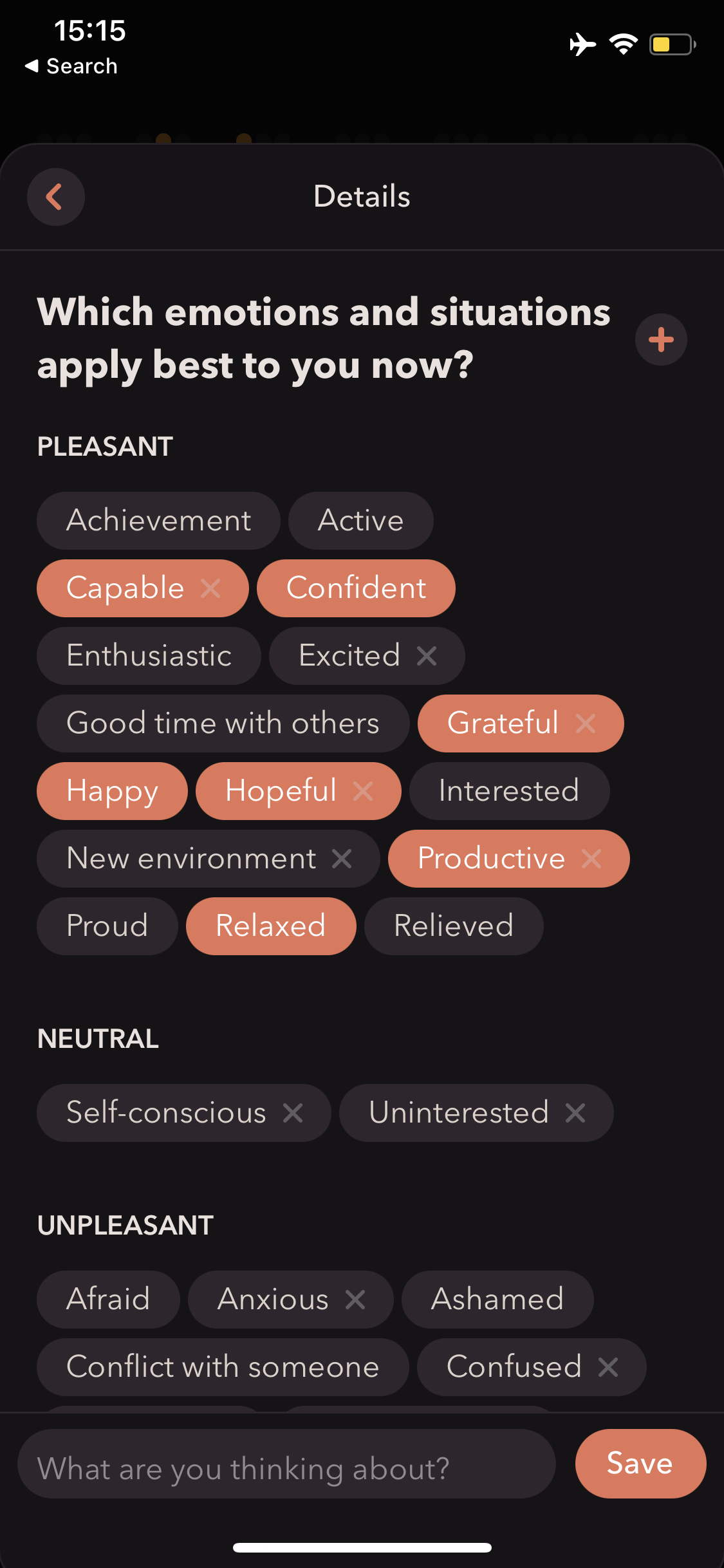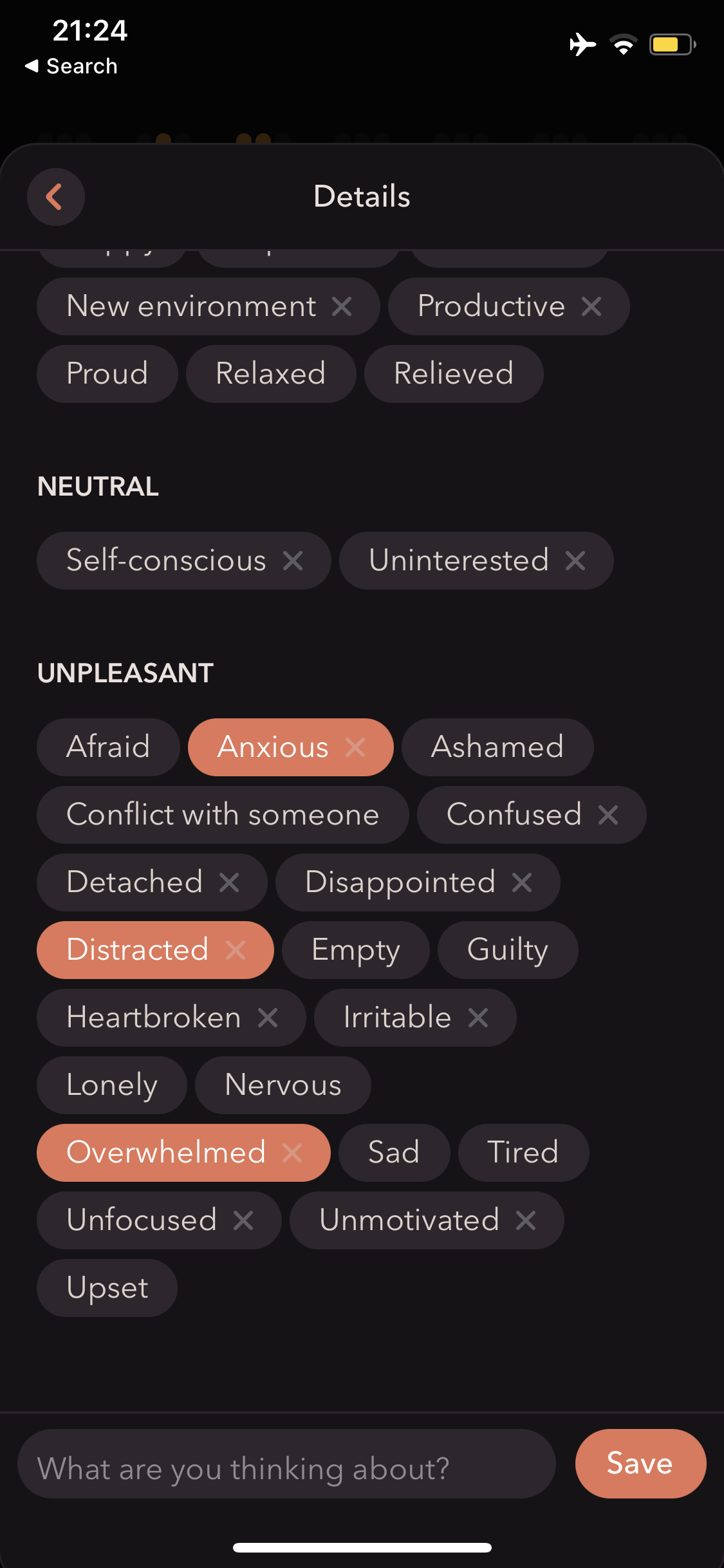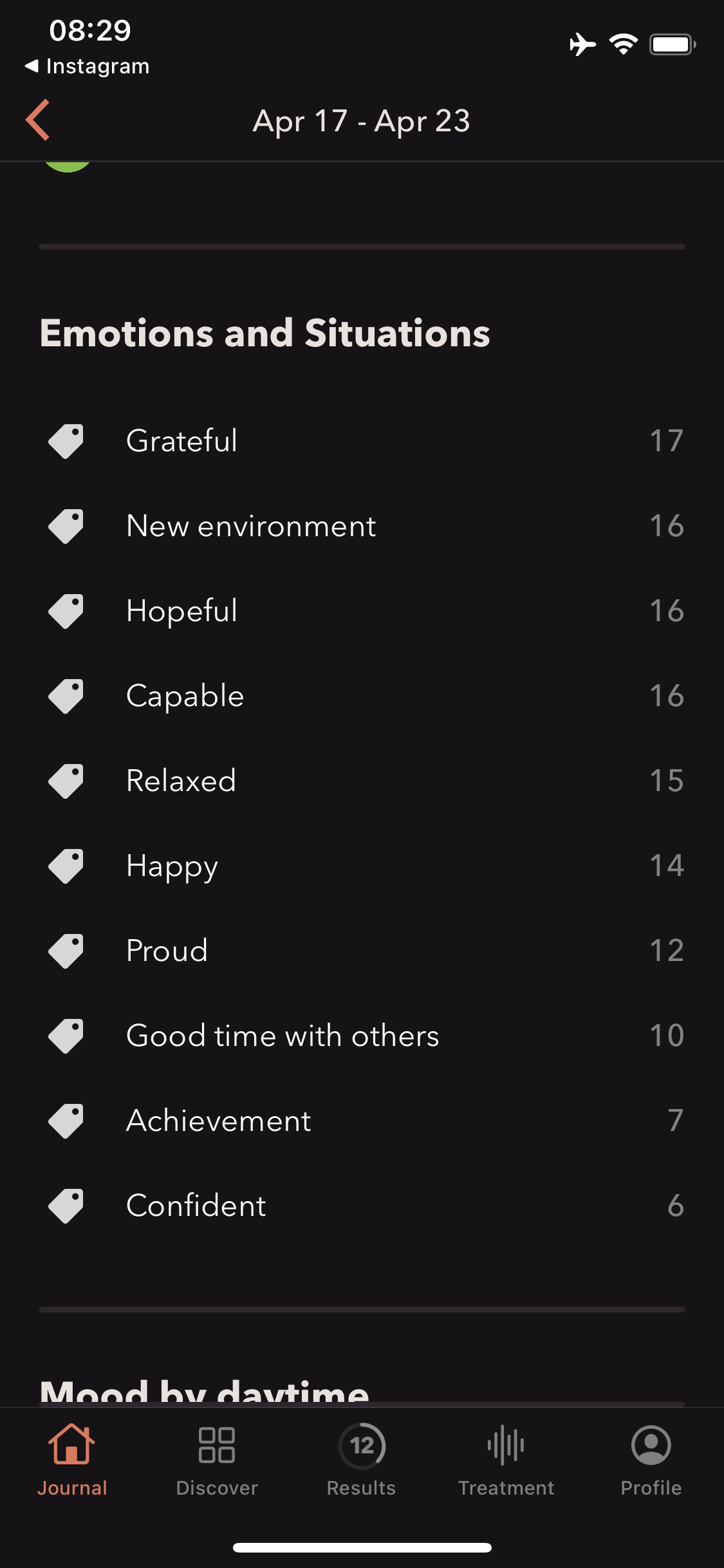My Experience Using the MindDoc App to Track My Mental Wellbeing
/MindDoc is a mental health app that allows users to track their moods and emotions, recognize and identify patterns, and learn strategies for coping and self-managing symptoms and behaviors.
Why I Started Using MindDoc
I think we can all agree that the last few years didn’t happen quite as any of us may have anticipated.
In the past year, I’ve wavered between extremes on an emotional scale: from the excitement over the first signs of a return to normal life since the beginning of the pandemic and being able to hug my parents for the first time in over a year, to celebrating reaching financial and career goals, to then experiencing the most devastating heartbreak I’ve ever known, and managing the effects of mysterious health concerns and rapid weight loss, to then developing a renewed and profound sense of gratitude for my friends, my family, my freedom, my career, and my ability to travel extensively- I’ve certainly experienced many highs and lows.
When I was at a low point last October (2021), a friend recommended I give MindDoc a try, and I am so glad I did. It’s been most effective by serving as a daily reminder to prioritize my mental wellbeing, and offers a number of helpful features for coping and self-managing symptoms and behaviors. Though I have come a long way and am in a better state of mental health now than I was when I first started using the app, I am finding that I continue to benefit from using MindDoc daily even though things have been going great lately.
This article describes my personal experience using MindDoc and includes a short explanation of how it works, details of specific features that I enjoy, how those features have helped me personally, who I think could benefit from using MindDoc, and how to get started. At the end of this post, I also share details on how to use my discount code (CARINA50) for 50% off a 6-month subscription of MindDoc.
How MindDoc Works
The MindDoc app was developed by psychologists, and can be used as a tool for individuals to self-manage their mental wellbeing or as an additional resource for individuals that use it in conjunction with traditional therapy.
When you sign up for MindDoc, you will get notifications three times a day to answer questions about a range of topics related to mental health, and will be asked to indicate your current mood and add any notes and specific emotions that you are feeling at the moment. After two weeks (and every two weeks after that) of recording your responses, you will get your first assessment.
The more honest you are, the more accurate the assessments, and the more helpful they will be overall for yourself or for a therapist that you choose to share the assessments with. With continued use you can begin to notice trends, identify areas that you may struggle with, and keep track of your progress and any improvements over time.
Depending on how you answer the questions and record your moods, your assessment will let you know if it recommends seeking professional treatment with a mental health practitioner. Additionally, the app will provide relevant strategies and guides (in the form of written and audio content) that can help you self-manage your mental and emotional wellbeing.
My Favorite MindDoc Features
One of my favorite features of MindDoc is that it prompts you multiple times throughout the day to catch you in your real feelings. It’s normal for my mood to change throughout the day and throughout the week, so I find it helpful (and more accurate) to record my answers and current emotions every morning, midday, and evening. As opposed to having to initiate each entry or being motivated to do so by a strong emotion, I can just go about my day and record my entries whenever I’m prompted, or whenever I see the notification on my phone. I’m able to answer thoughtfully, but without having to think too hard, and honestly, without having to second guess if my responses in that moment are truly reflective of how I’m feeling. Because answering the prompts have now become a part of my daily routine, I’ve begun to notice I now think about my responses rationally instead of emotionally.
I also love that within the MindDoc app, you can customize your listed emotions to be most accurate or representative of your feelings. The app offers examples of pleasant, neutral, and unpleasant emotions and situations, but as I’ve been using the app for several months and gotten to know myself a little better, I’ve added my own that I felt were most accurate. For example, some of the positive emotions and situations I’ve added are capable, grateful, hopeful, productive, and new environment. Some of the neutral emotions I’ve added are self-conscious and uninterested, and some of the unpleasant emotions I’ve added are anxious, confused, detached, irritable, and overwhelmed. Every two weeks when I receive a new assessment, I can see how often I recorded each emotion or situation, giving me quantifiable insight into how I’ve truly been feeling.
Because MindDoc only takes a few minutes out of my day to answer the questions and record my moods, it was easy to develop my use as a healthy habit that I could stick with consistently over the long term. In this regard, I’ve found that using MindDoc is more structured, more helpful, and easier than journaling, and more realistic of a commitment that I can incorporate into my daily life. (Of course if journaling is helpful for you, there is also a field in the MindDoc app where you can jot down any additional notes.) I also find it helpful that the app revisits some of the same topics and questions that I may have answered before, therefore serving as a baseline so I can actually track any changes or improvements over time. I find this structure helpful because regardless of what’s going on in my life or my schedule, it’s nice to have the consistency that MindDoc provides to ground me and maintain a baseline perspective.
Another MindDoc feature that I have found most helpful and profound is the ability to see your overall moods within a calendar view. This view gives you a nice visual of how you are doing over time, and is an easy way to recognize clusters of colors that represent the five mood categories: very good, good, moderate, bad, or very bad. The app also allows you to choose a color palette if you have a preference for associating these mood categories with specific colors. In the next section titled “How MindDoc Has Helped Me”, I will go into more detail about the calendar view feature and why I find it so helpful.
Though I’ve described my most favorite MindDoc features above, other great features that the app provides include the ability to export your assessments (to share with a therapist if you choose), a content library full of guides and resources to support your mental wellbeing, and the ability to view weekly snapshots (“Your Moodweek”) if you are seeking more insight between the assessments that are provided every two weeks.
How MindDoc Has Helped Me
There is no doubt that I am mentally in a much better place now, after using MindDoc for several months, than I was before I had started using it. Around the same time that I started using it was when I noticed a drastic change in when I started to feel better and happier, though I’m not sure if I was more open to trying MindDoc out because I was in a state where I was ready to be happier, or if the timing was simply a coincidence. Regardless, a part of me wonders if I would have started feeling better sooner had I started using MindDoc sooner, and I honestly think I would have. I have noticed that using MindDoc has helped me in a number of ways:
By checking in with my moods and emotions often, the practice of using MindDoc makes me very aware of what is making me happy and subsequently encourages me to do more of it. Over the course of the last seven months since I started using MindDoc, I feel as though it’s trained me to seek and maintain balance and pursue things that are professionally productive and personally fulfilling, which thankfully within my line of work are often intertwined. I’ve found that the practice of using MindDoc daily has been beneficial for maintaining awareness of my mental health, even if (and especially when) things are going well. With increased awareness comes the positive feeling of being proactive and productive about taking care of my mental health, which then encourages me to continue forming and maintaining better habits overall.
Another way MindDoc has helped me is by looking retroactively at my moods in the calendar view. I’m able to look back and identify trends as they relate to what I was doing, what I was anticipating, or what I was recovering from on specific dates or weeks. Having this as a guide, I can better manage my expectations when looking ahead to the future if I find that I will be exposed to similar situations, and whether they tend to be pleasant or unpleasant. As someone who travels continuously often for multiple weeks at a time, I can look back within the MindDoc app and see that I tend to experience both anxiety and excitement prior to leaving on a big trip, and feelings of contentment and accomplishment when I’m experiencing new environments. This helps me self-manage my anxiety as I prepare for a big trip, as I remind myself that the unpleasant emotions are only temporary and that I’ll be proud of myself once I settle in to my next destination.
I occasionally miss the notification to answer the questions which will then be shown as blank within the MindDoc calendar view, but over time I’ve been able to notice a trend that when I miss the prompts it’s usually because I’m doing something I really enjoy like skiing or traveling and am not readily available on my phone. Because I’ve recognized this as a pattern, when I look back at blank spots in my calendar I associate them with something positive!
Personally one of the biggest barriers or hurdles for me to start traditional therapy would be the initial matching and meeting with a therapist and having to start explaining my past, my moods, my emotions, and my tendencies from square one- a situation I would find very overwhelming and daunting, and potentially repetitive if I had do so every time I met with a new therapist. Now since I’ve been using MindDoc consistently, the idea of maybe someday starting therapy is much less daunting knowing I am well-prepared and have many months worth of data and trends recorded that I can simply export and share with a therapist. Having a good amount of background in the form of quantifiable data to present to a therapist at the first meeting puts me at ease and makes the idea of starting therapy more approachable. The data gives a bigger picture of what has been going on in my life, which I feel is more valuable than what I could ever explain by myself in one sitting- therefore eliminating the hurdle of having to verbally express all those feelings at once in a scheduled session.
Who Can Benefit from MindDoc
Someone who changes environments often
The most convenient feature of MindDoc is that it’s always readily accessible and in the palm of your hand. Regardless of where you are in the world, your time zone, your routine (or lack there-of), your work schedule, or your sleep schedule, the MindDoc app can be a constant in your daily life.
Someone who is considering therapy but doesn’t know if they’re ready
Because it’s so easy to get started using MindDoc, it is a much more manageable commitment (both practically and economically) than jumping straight into therapy. Additionally, using MindDoc will better prepare you (not only mentally, but also empirically with assessments that you can export) should you choose to seek help from a traditional therapist. Based on the responses you record in the app, MindDoc will also give you recommendations if there is an indication that you should seek treatment.
Someone who is already using therapy but is looking to supplement their treatment with quantifiable data
By tracking your moods and emotions multiple times a day, over the course of weeks or months, you will likely be able to better visualize long term trends and any progress you make toward improvements in your overall mental wellbeing. It will likely also give you insight into whether traditional therapy is helping you over the long term, or notice trends if you tend to feel better or worse before or after your therapy sessions.
Someone who isn’t interested in therapy but is curious about other ways to track their mental well-being
Even if you have no intention of going to therapy, using MindDoc is still helpful if you like to practice mindfulness about your emotions or are just curious about tracking your moods over time. Maintaining awareness of one’s mental wellbeing is always beneficial, even when things in life are generally going great.
People looking for ways to offer tangible support to someone that needs help
Beyond being helpful for my own mental wellbeing, what I’ve found to be especially useful about MindDoc is that it’s a tool that you can easily recommend to someone else who is in need of support. In the past, I personally have found myself in situations where I wished I could have done more for a friend who was going through a tough time. Now in addition to listening, spending quality time, and attempting to offer advice, it has been wonderful to be able to also recommend MindDoc as a tangible instrument that can aide and encourage them.
How to Get Started Using MindDoc
Getting started with MindDoc is as easy as downloading the app, signing up for an account, and answering a set of questions when you are prompted by a notification on your phone three times a day. After two weeks of answering the questions (it’s okay if you miss them sometimes, but the more you can answer, the more helpful and accurate your assessment will be), MindDoc will provide you with an assessment. As you continue answering the questions, MindDoc will continue providing you with assessments and will offer additional content recommendations on topics that are relevant to you.
MindDoc offers a few pricing tiers for their subscriptions based on how many months you sign up for. They currently offer 3-months for $29.99, 6-months for $44.99, or 1-year for $69.99. If you sign up for 6-months using my promo code (CARINA50), you will get a 50% discount off the regular price (it will be $22.49 for 6-months instead of $44.99). Regardless of which option you choose, MindDoc is considerably more cost-effective over time when compared to traditional therapy. If you already go to therapy and use MindDoc as a supplement, it’s a nominal additional cost that will make your therapy sessions more productive and worth-while.
Are you considering using MindDoc or know someone who could benefit from it? You can read more about how it works on their website here, or if you’re on mobile click here to read more information in the Apple App Store.
This article was created in partnership with MindDoc, though all opinions expressed are my own, formed over the course of seven months (at the time of writing) of voluntarily using MindDoc daily. I only recommend products and services that I truly believe in and hope will be beneficial or useful to my audience.











